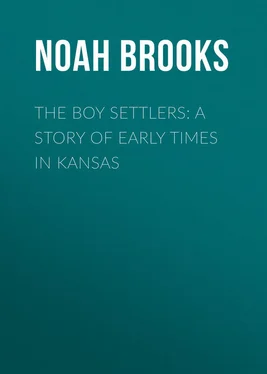Noah Brooks - The Boy Settlers - A Story of Early Times in Kansas
Здесь есть возможность читать онлайн «Noah Brooks - The Boy Settlers - A Story of Early Times in Kansas» — ознакомительный отрывок электронной книги совершенно бесплатно, а после прочтения отрывка купить полную версию. В некоторых случаях можно слушать аудио, скачать через торрент в формате fb2 и присутствует краткое содержание. Жанр: foreign_antique, foreign_prose, foreign_children, на английском языке. Описание произведения, (предисловие) а так же отзывы посетителей доступны на портале библиотеки ЛибКат.
- Название:The Boy Settlers: A Story of Early Times in Kansas
- Автор:
- Жанр:
- Год:неизвестен
- ISBN:нет данных
- Рейтинг книги:5 / 5. Голосов: 1
-
Избранное:Добавить в избранное
- Отзывы:
-
Ваша оценка:
- 100
- 1
- 2
- 3
- 4
- 5
The Boy Settlers: A Story of Early Times in Kansas: краткое содержание, описание и аннотация
Предлагаем к чтению аннотацию, описание, краткое содержание или предисловие (зависит от того, что написал сам автор книги «The Boy Settlers: A Story of Early Times in Kansas»). Если вы не нашли необходимую информацию о книге — напишите в комментариях, мы постараемся отыскать её.
The Boy Settlers: A Story of Early Times in Kansas — читать онлайн ознакомительный отрывок
Ниже представлен текст книги, разбитый по страницам. Система сохранения места последней прочитанной страницы, позволяет с удобством читать онлайн бесплатно книгу «The Boy Settlers: A Story of Early Times in Kansas», без необходимости каждый раз заново искать на чём Вы остановились. Поставьте закладку, и сможете в любой момент перейти на страницу, на которой закончили чтение.
Интервал:
Закладка:
“Oxen,” sententiously replied the newcomer.
“And what’s them thar cattle follering on behind?” he asked, pointing to a drove of milch-cattle in the rear.
“Caouws,” answered the immigrant, in the broad pronunciation peculiar to provincial people of the New England States.
“All right,” was the rejoinder; “a man that says ‘caouws’ can’t go over this yere ferry withouten he’s got the tickets.” No argument would induce the ferryman to explain what the tickets were and where they could be procured. Finally, his patience exhausted, the free-State man suddenly drew from the big pockets of his frock a pair of tremendous pistols, ready cocked, and, holding them full in the face of the surprised ferryman, he said,–
“Here are my tickets, and I’m going across this ferry right off, caouws or no caouws!” And he went.
Even at Parkville, where there was very little difficulty in crossing, as compared with what there had been earlier in the struggle for Kansas, they were advised by discreet friends and sympathizers to be on the lookout for opposition. Every fresh arrival of free-State men angered yet more the Borderers who were gathered there to hinder and, if possible, prevent further immigration. Mr. Bryant chafed under the necessity of keeping his voice hushed on the topic that engaged all his thoughts; and Oscar and Sandy were ready to fight their way across the river; at least they said so.
They did find, however, that the buying of provisions and farming-tools required for their future use, was out of the question in Parkville. Whether it was the unexpected demand, or a refusal of the Missourians to sell to free-State men, they could not determine. But the prices of everything they wanted were very high. What should they do? These articles they must have. But their cost here was far beyond their most extravagant estimates. When Mr. Howell was reminded by his brother-in-law how he had said that no politics could interfere with trade and prices, he was amused.
“Of course,” he said, “it does look as if these Missourians would not sell at fair prices because they want to hinder us; but don’t you see that the demand is greater than the supply? I know these folks are bitterly hostile to us; but the reason why they have so small a stock of goods on hand is that they have sold out to other free-State men that have come before us to buy the same things. Isn’t that so?”
Mr. Bryant was obliged to admit that this was a reasonable explanation; but as he had begun by thinking that every Borderer hated a free-State man and would do him an injury if he could, he did not give up that notion willingly. He was certain that there was a plot in the high prices of bacon, flour, corn-meal, and ploughs.
In this serious dilemma, Charlie came to the relief of the party with the information that a free-State man, whose team had just recrossed the river for a load of supplies sent him by a wagon that was to return to Iowa, brought news that a large trading-post had been opened at a new Kansas town called Quindaro. He said that the Iowa man told him that prices were just now lower in Quindaro than they had ever been in Parkville.
“Quindaro?” said Oscar, musingly;–“why, that must be an Indian name,–feminine Indian name, too, unless I miss my guess.”
Mr. Bryant had heard of Quindaro. It was a brand-new town, a few miles down the river, settled by free-State men and named for a young, full-blooded Indian girl of the Delaware tribe. The town was on the borders of the Delaware reservation, which in those days came close to the Missouri River. Charlie, also, had gathered some facts about the town, and he added that Quindaro was a good place to start from, going westward. The party had laid in a stock of groceries–coffee, tea, and other articles of that description–before leaving home. Now they needed staple provisions, a few farming tools, a breaking-plough, and some seed corn. Few thought of planting anything but corn; but the thrifty settlers from Illinois knew the value of fresh vegetables, and they were resolved to have “garden truck” just as soon as seeds could be planted and brought to maturity.
“And side-meat?” asked Sandy, wonderingly, as he heard his father inquiring the price of that article of food. Side-meat, in the South and West, is the thin flank of a porker, salted and smoked after the fashion of hams, and in those parts of the Southwest it was (and probably is) the staple article of food among the people. It is sold in long, unattractive-looking slabs; and when Sandy heard its name mentioned, his disgust as well as his wonder was kindled.
“Side-meat?” he repeated, with a rising inflection. “Why, I thought we were going to live on game,–birds and buffalo and the like! Side-meat? Well, that makes me sick!”
The two men laughed, and Mr. Howell said,–
“Why, Sandy, you are bent on hunting and not on buckling down to farm work. How do you suppose we are going to live if we have nothing to eat but wild game that we kill, and breadstuffs and vegetables that we buy?”
Sandy had thought that they might be able to step out into the woods or prairie, between times, as it were, and knock down a few head of game when the day’s work was done, or had not begun. When he said as much, the two heads of the party laughed again, and even Charlie joined in the glee.
“My dear infant,” said his father, seriously, but with a twinkle in his eye, “game is not so plenty anywhere as that; and if it were, we should soon tire of it. Now side-meat ‘sticks to the ribs,’ as the people hereabouts will tell you, and it is the best thing to fall back upon when fresh meat fails. We can’t get along without it, and that is a fact; hey, Charlie?”
The rest of the party saw the wisdom of this suggestion, and Sandy was obliged to give up, then and there, his glowing views of a land so teeming with game that one had only to go out with a rifle, or even a club, and knock it over. But he mischievously insisted that if side-meat did “stick to the ribs,” as the Missourians declared, they did not eat much of it, for, as a rule, the people whom they met were a very lank and slab-sided lot. “Clay-eaters,” their new acquaintance from Quindaro said they were.
“Clay-eaters?” asked Charlie, with a puzzled look. “They are clayey-looking in the face. But it can’t be possible that they actually eat clay?”
“Well, they do, and I have seen them chewing it. There is a fine, soft clay found in these parts, and more especially south of here; it has a greasy feeling, as if it was a fatty substance, and the natives eat it just as they would candy. Why, I should think that it would form a sand-bar inside of a man, after awhile; but they take to it just as naturally!”
“If I have got to choose between side-meat and clay for a regular diet,” said Sandy, “give me side-meat every time.”
That night, having made their plans to avoid the prying eyes of the border-State men, who in great numbers were now coming in, well-armed and looking somewhat grimly at the free-State men, the little party crossed the river. Ten dollars, good United States money, was demanded by the ferryman as the price of their passage; it looked like robbery, but there was no other way of getting over the river and into the Promised Land; so it was paid, with many a wrench of the patience of the indignant immigrants; and they pitched their tent that night under the stars and slept soundly on the soil of “bleeding Kansas.”
Bright and early next morning, the boys were up and stirring, for now was to begin their camp life. Hitherto, they had slept in their tent, but had taken their meals at the farm-houses and small taverns of the country through which they had passed. They would find few such conveniences in the new country into which they had come, and they had been warned that in Kansas the rule was “every man for himself.”
Читать дальшеИнтервал:
Закладка:
Похожие книги на «The Boy Settlers: A Story of Early Times in Kansas»
Представляем Вашему вниманию похожие книги на «The Boy Settlers: A Story of Early Times in Kansas» списком для выбора. Мы отобрали схожую по названию и смыслу литературу в надежде предоставить читателям больше вариантов отыскать новые, интересные, ещё непрочитанные произведения.
Обсуждение, отзывы о книге «The Boy Settlers: A Story of Early Times in Kansas» и просто собственные мнения читателей. Оставьте ваши комментарии, напишите, что Вы думаете о произведении, его смысле или главных героях. Укажите что конкретно понравилось, а что нет, и почему Вы так считаете.












